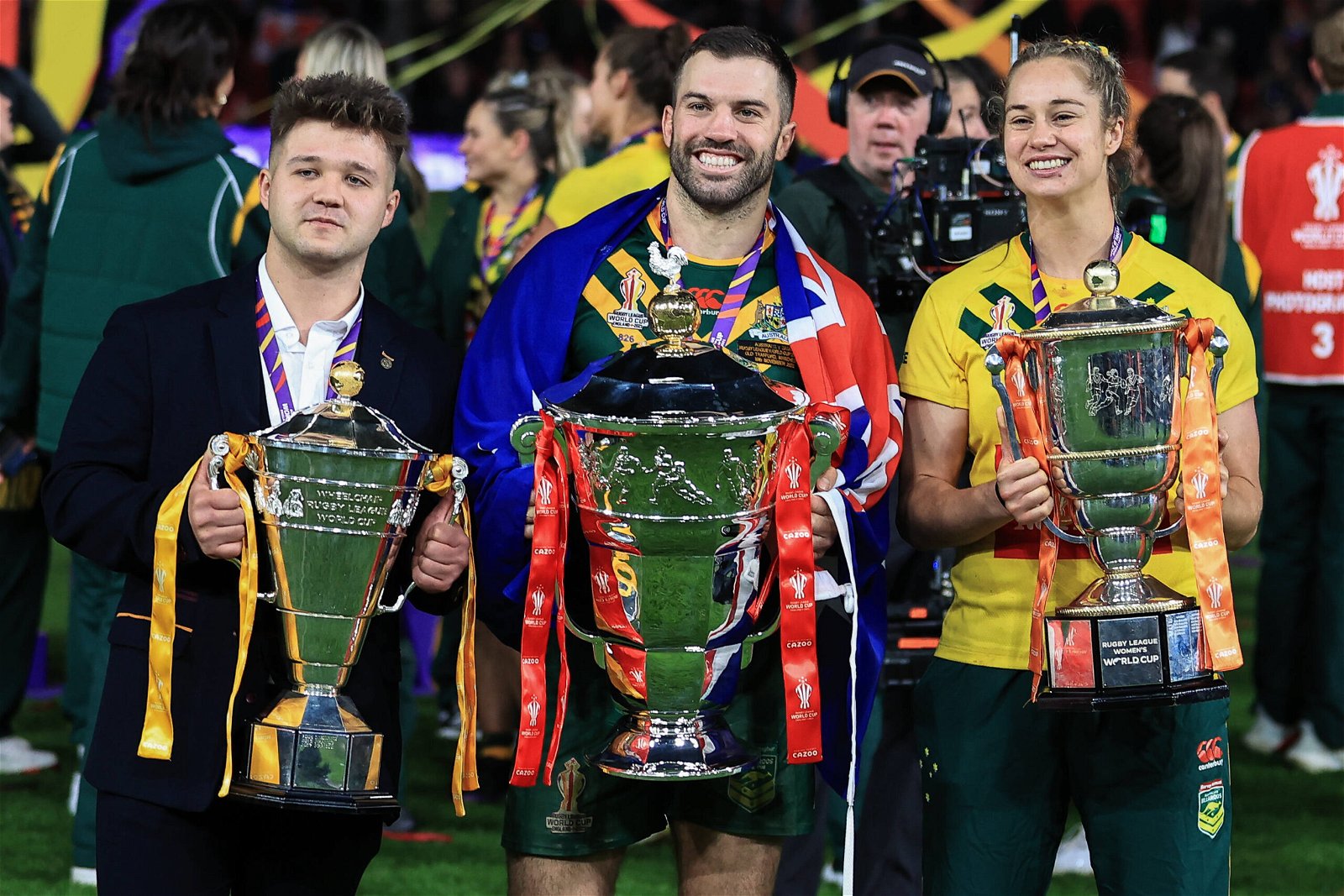
International Rugby League met over the past weekend to negotiate and discuss the future of the international game and it’s now been confirmed that the 2025 World Cup will be delayed to 2026.
It was one of a number of announcements made by the IRL including the return of Ashes series for both men and women with England set to tour Australia in 2025.
The calendar itself has been filled out until 2030 with lots of exciting things planned and most importantly, a plan that truly plans out the future of the international game and therefore secures it’s future.
The IRL confirmed the news on their website before heading up a press conference and they listed the key points as follows:
“International Rugby League has agreed an International Calendar to 2030.
The return of the Ashes, with England Men and Women to tour Australia in 2025.
“Kangaroo and Kiwi tours to resume.
“International tours for other nations are back on the agenda.
“Dedicated Northern Hemisphere and Southern Hemisphere Tri-Nations and Four Nations tournaments.
“Greater emphasis on Regional Championships and World Cup qualifying process, including a new World Series to help nations develop.
“Men’s and Women’s games to grow under new International Calendar.
“Change to World Cups cycle, with the next World Cup for Men’s, Women’s and Wheelchair teams to be staged in 2026.
“A World Cup every two years, with a stand-alone Women’s World Cup in 2028, followed by the Men’s World Cup in 2030.
“No World Cup 9s in the calendar as IRL focuses on developing 13-a-side and Wheelchair games.”
They also attached the following statement:
“An IRL board meeting in Singapore has agreed to a new calendar to 2030 aimed at capitalising on the growth of the international game.
“Tonga’s historic end-of-season series against England and the anticipated announcement of new tournaments in both the Southern Hemisphere and the Northern Hemisphere are set to signal the start of an exciting new era.
“The development of Tri-Nations or Four Nations tournaments in each hemisphere will be key features of the first five years of the International Calendar.
“There will also be more international tours, with the return of the Ashes in 2025 when England Men’s and Women’s teams travel to Australia.
“The Kiwis and Kangaroos will head north to play England in 2027 and 2028 respectively.
“The next Rugby League World Cup for Men’s, Women’s and Wheelchair teams has been moved to 2026 and will be staged in the Southern Hemisphere after France’s withdrawal as hosts for the scheduled 2025 tournament.
“A stand-alone Women’s World Cup will be staged in 2028, with the next Men’s World Cup, after RLWC2026, to be held in 2030.
“Regional Championships and World Cup qualifying tournaments for the Americas, Asia-Pacific, Europe and Middle East-Africa will take on greater emphasis, while a new World Series format is also being developed.
“Further details about those tournaments and other international fixtures in the next five years will be announced by participating nations in coming weeks after consultation with IRL member nations.
“There will also be announcements about the International Calendar beyond 2027 during the international window later this year.”
IRL Chair Troy Grant said: “It is no secret that the Achilles heel for international rugby league for far too long has been the absence of an International Calendar.
“The ad hoc nature of tournaments and international matches, and the absence of any clarity for nations, players and fans to plan their seasons, is over.
“The International Calendar respects player workloads and importantly also reduces the impact on professional clubs.
“The standards have improved dramatically in recent years regarding player welfare and player workload issues, and they were key considerations in the calendar design.
“After we secure the future of international rugby league, our calendar will help rejuvenate and allow the game to grow globally, recognising the elite in our game and providing pathways for development of the game across all levels.
“I saw first-hand during RLWC2021 in England last year how much it means for players in each of our three disciplines to be able to represent their country of birth or heritage, put on that jersey and play with such pride for their family and nations.
“I couldn’t be happier that we have finally arrived with our much-anticipated calendar. It’s been frustrating and I’ve shared the frustrations of fans, our nations, our clubs and the game broadly that we have failed to realise the potential the international game offers.
“Our calendar will allow us firstly to secure the future of international rugby league, with quality and consistent matches that are competitive, build on traditional rivalries and showcase the greatest game on earth.
“The Ashes return, with England Men’s and Women’s teams to tour Australia in 2025, while international tours are back, with Tonga heading to England in 2023 in an historic start to the new era.
“We have had some well-known legacy issues and world impacting events that have disrupted and destabilised our best efforts but its onwards and upwards from here.
“I want to sincerely thank the Chairs of the Australian Rugby League Commission, England’s Rugby Football League, the Asia-Pacific and European confederations, and the New Zealand Rugby League for their contributions and coming together for the good of the game to make our calendar a reality.”
ARLC Chair Peter V’landys AM said: “The Commission has a focus on growing the international game, with a strong desire to grow rugby league in the Pacific in particular. That starts with having an International Calendar for at least the next five years.
“Accordingly, I thank the Chairman of the IRL Troy Grant, who has been tireless in his pursuit of having a calendar that will grow the international game. His efforts have been rewarded and I’m excited with the opportunities the International Calendar will provide.
“Of equal importance is that there is now a strong plan in place to grow the women’s game at international level. This aligns with the growth of the NRLW competition and the growth of the women’s game at grassroots level.”
RFL Chair Simon Johnson said: “I am delighted that we have been able to bring certainty and growth opportunities to the international game by agreeing a long-term calendar.
“I am grateful to all my colleagues on the IRL Board for the constructive and collegiate spirit displayed in our discussions that have enabled us to confirm such exciting tours and enable the international game to fulfil its potential.
“This is a very exciting day for the game of Rugby League.”




























